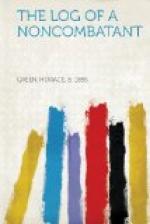Our experience that day, as later events proved, was not an extraordinary occurrence for war-time, especially for those endeavoring to gain entrance to an invested city. But as our first and maiden adventure it somewhat shook our nerve. When the grilling was over we felt about as guilty as any criminal who has been put through the third degree as practiced in the old police department days, and I had several times to look over my passport and letters of credentials to persuade myself that I was really not a spy. Eventually we were permitted to pass the gates of the Gare du Nord. Once inside the city gates, we made our way into the Place Verte and went directly to the Hotel St. Antoine, whose proprietor sent our names to police headquarters. The St. Antoine was at that time the residence of the diplomatic corps and the Belgian ministers of state, and was fifty yards from the Royal Palace and across the street from headquarters of the Belgian General Staff.
There is no need of describing in detail Antwerp at the time of my first visit. One or two pictures will suffice to give a rough idea of its existence up to the time of the bombardment. Try to imagine, for example, going about your business in New York or Boston or Los Angeles (of course Antwerp is smaller than these) when your country, a territory perhaps the size of the New England States, was already two thirds overrun, burnt, smashed, and conquered by a hostile nation, whose forces were now within nineteen miles of the gates of the capital. Imagine that nation’s warriors in the act of crushing your tiny army, whose remnants were already exhausted and on the verge of despair. Then picture a quaint, sleepy city, with shadowy alleys and twisting, gabled




